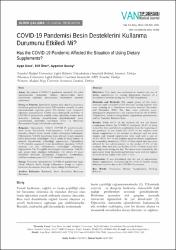| dc.contributor.author | Dost, Ayşe | |
| dc.contributor.author | Üner, Elif | |
| dc.contributor.author | Susoy, Ayşenur | |
| dc.date.accessioned | 2023-04-06T08:36:55Z | |
| dc.date.available | 2023-04-06T08:36:55Z | |
| dc.date.issued | 2021 | en_US |
| dc.identifier.citation | Dost, A., Üner, E. ve Susoy, A. (2021). COVID-19 pandemisi besin desteklerini kullanma durumunu etkiledi mi? Van Tıp Dergisi, 28(4), 538-545. https://dx.doi.org/10.5505/vtd.2021.25483 | en_US |
| dc.identifier.issn | 1300-2694 | |
| dc.identifier.issn | 2587-0351 | |
| dc.identifier.uri | https://dx.doi.org/10.5505/vtd.2021.25483 | |
| dc.identifier.uri | https://hdl.handle.net/20.500.12511/10813 | |
| dc.description.abstract | Amaç: Bu çalışma COVID-19 pandemisi sürecinde bir vakıf üniversitesinin hemşirelik bölümü öğrencilerinin besin desteklerini kullanma durumlarının incelenmesi amacıyla yapılmıştır. Gereç ve Yöntem: Tanımlayıcı kesitsel tipte olan bu çalışmanın örneklem grubunu Kasım-Aralık 2020 tarihleri arasında bir vakıf üniversitesinde öğrenim gören 216 birinci sınıf hemşirelik öğrencisi oluşturmuştur. Veriler sosyo-demografik özellikler ve COVID-19 pandemisine yönelik endişe durumları formu, besin destekleri kullanım alışkanlıklarını değerlendirmek üzere araştırmacılar tarafından hazırlanan anket ve Beslenme Davranışları Ölçeği kullanılarak toplanmıştır. Bulgular: Öğrencilerin %68,5’i COVID-19 pandemisinden önce besin desteklerini kullanmıyorken, %45,4’ü pandemi başından itibaren besin destek ürünü kullandığını belirtmiştir. Öğrencilerin %32,4’ü hastalıklara karşı dirençli olmak amacıyla besin desteklerini kullandığını, %31,5 oranla en fazla vitamin ve mineral desteklerinin kullanıldığı saptanmıştır. Öğrencilerin %19’u kendisi araştırarak besin desteklerine ulaşırken, %39,8’i medyada yer alan reklamlardan etkilendiğini söylemiştir. Öğrencilerin %67,1’i sağlıklı beslendiğini düşünmekte, %60,2’si gün içinde öğün atladığını belirtmiştir. En yüksek 24 puan alınabilen beslenme davranışları ölçeğinden, katılımcıların aldıkları ortalama puan 12,47±3,61 olarak bulunmuştur. Sonuç: Üniversite öğrencilerinin COVID-19 pandemisine bağlı olarak bilinçsiz besin desteği kullanımının arttığı ve sağlıklı beslenme davranışları düzeyinin düşük olduğu belirlenmiştir. | en_US |
| dc.description.abstract | Objective: This study was conducted to examine the use of dietary supplements by nursing department students of a foundation university during the COVID-19 pandemic. Materials and Methods: The sample group of this crosssectional study consisted of 216 first-year nursing students who were studying at a foundation university between November and December 2020. The data were collected sociodemographic characteristics and concern form for the COVID- 19 pandemic, habits of using dietary supplements questionnaire, and the Nutrition Behavior Scale. Results: While 68.5% of the students did not use dietary supplements before the COVID-19 pandemic, 45.4% of them stated that they used dietary supplements from the beginning of the pandemic. It was found that 32.4% of the students used dietary supplements to be resistant to diseases, and the most vitamin and mineral supplements were used with a rate of 31.5%. While 19% of the students accessed dietary supplements by researching themselves, 39.8% of them stated that they were affected by the advertisements in the media. 67.1% of the students think that they eat healthy, 60.2% of them stated that they skip meals during the day. The mean score obtained by the participants from the nutritional behavior scale with the highest score of 24 was found to be 12.47 ± 3.61. Conclusion: It was determined that the use of unconscious dietary supplements increased and the level of healthy eating behaviors was low due to the COVID-19 pandemic. | en_US |
| dc.language.iso | tur | en_US |
| dc.rights | info:eu-repo/semantics/openAccess | en_US |
| dc.subject | Pandemik | en_US |
| dc.subject | Besin Destekleri | en_US |
| dc.subject | Beslenme Davranışı | en_US |
| dc.subject | Pandemics | en_US |
| dc.subject | Dietary Supplements | en_US |
| dc.subject | Feeding Behavior | en_US |
| dc.title | COVID-19 pandemisi besin desteklerini kullanma durumunu etkiledi mi? | en_US |
| dc.title.alternative | Has the COVID-19 pandemic affected the situation of using dietary supplements? | en_US |
| dc.type | article | en_US |
| dc.relation.ispartof | Van Tıp Dergisi | en_US |
| dc.department | İstanbul Medipol Üniversitesi, Sağlık Bilimleri Yüksekokulu, Hemşirelik Bölümü | en_US |
| dc.authorid | 0000-0002-7644-4076 | en_US |
| dc.identifier.volume | 28 | en_US |
| dc.identifier.issue | 4 | en_US |
| dc.identifier.startpage | 538 | en_US |
| dc.identifier.endpage | 545 | en_US |
| dc.relation.publicationcategory | Makale - Ulusal Hakemli Dergi - Kurum Öğretim Elemanı | en_US |
| dc.identifier.doi | 10.5505/vtd.2021.25483 | en_US |
| dc.institutionauthor | Dost, Ayşe | |
| dc.identifier.trdizinid | 1123341 | en_US |


















